Know Thy Enemy: Coordination Failures

Dear Bankless Nation,
Coordination failures are all around us.
It’s why governments hold arsenals of nuclear weapons, even while knowing the existential risk to humanity.
It’s why we consume fossil-fuel-burning products, even while knowing the aggregate harm they impose on the environment we live in.
Tragedy of the commons. Games of theoretic dystopias.
There’s no single person at fault…We just don’t have the coordination technology to solve problems like these and slay Moloch 🔪 👹.
So what do we do?
First, know thy enemy.
We need to study coordination failures in order to defeat Moloch.
So we brought in Kevin Owocki to give us a lesson.
Let’s dive in.
- RSA
P.S. CoinDesk Consensus 2021 is gonna be lit! 🔥 Top minds are speaking at the event like Ray Dalio, Michael Saylor, and even our own David Hoffman. Register here.
THOUGHT THURSDAY
Guest Writer: Kevin Owocki, founder of Gitcoin
Coordination Failures — Know Thy Enemy

"Know thy enemy and know yourself; in a hundred battles, you will never be defeated.
When you are ignorant of the enemy but know yourself, your chances of winning or losing are equal.
If ignorant both of your enemy and of yourself, you are sure to be defeated in every battle." Sun Tzu, Art of War
Coordination failure occurs when a group of humans could achieve a desirable outcome by working together, but fail to do so because they don’t coordinate their decision making.
Coordination failures are often why we can’t have nice things because they are rampant in many systems around the world.
Let’s explore why.
What are coordination failures?
Some examples of coordination failures in the modern world are:
- Nation-states refuse to give up Nuclear Arms because they want to defend themselves despite the existential threat they pose to the world.
- Consumers refuse to give up fossil fuel-powered services because they want to get around conveniently despite the existential threat fossil fuel burning imposes on the world.
- Users of Open Source software consume Open Source Software because they want to build things faster despite the burnout that cumulative use imposes on OSS maintainers.
- Individual cells of the human body live harmoniously pooling their resources for the greater good of the organism; but if a cell defects from this equilibrium, it becomes cancerous—eventually outcompeting all the other cells and taking over the body.
- Coordination failure can be a self-fulfilling prophecy. For example, if one firm decides a recession is imminent and fires its workers, other firms might lose demand from the lay-offs & then respond by firing their own workers—leading to a recession.
Coordination failures are dictator-less dystopias, situations that every single citizen including the leadership hates but which nevertheless endures unconquered. From a god's-eye view, there is a clear problem with coordination failures; from within the system, no one actor can create change, so the best option is to continue ignoring the problem.
Multi-Polar Traps
Coordination failures have also been called multi-polar traps. A multi-polar trap goes something like this:
- Individual humans want to breathe clean air.
- There is work to be done to prevent pollution from having a high ppm (parts per million) in the air we breathe.
- Since clean air is non rivalrous (my consuming it does not stop you from consuming it) and non excludable (one cannot put clean air behind a velvet rope and charge for it) this means that each individual actor has a rational incentive to free ride on the system. Why contribute back to a fund to maintain clean air if I already get it for free. This is the first trap: the single player trap.
- If enough actors choose to free ride, the entire system begins to bear a burden, and if that burden increases to a point of systemic collapse, no one gets these public goods. This is the second trap: the multiplayer trap.
- From a god's-eye perspective, the obvious solution is for everyone to chip in a little bit—but without a coordination mechanism to ensure everyone does contribute, they do not.
One way to reduce the impact of coordination failures is to improve coordination sufficiently enough that the single players in the game are playing it like a multiplayer game.
When players in the game perceive common identity or purpose with one another, or if they have the negative externalities of their behavior priced into market-based decisions they make, they play the game together instead of separately—and avoid the second trap.
Prisoners Dilemma
One famous example of a coordination failure is the prisoner's dilemma. A prisoner's dilemma is an example of a situation analyzed in game theory that shows why two completely rational individuals might not cooperate, even if it appears that it is in their best interests to do so.
Here’s the example: Two members of a criminal gang are arrested and imprisoned. Each prisoner is in solitary confinement with no means of communicating with the other. The prosecutors lack sufficient evidence to convict the pair on the principal charge, but they have enough to convict both on a lesser charge. Simultaneously, the prosecutors offer each prisoner a bargain. Each prisoner is given the opportunity either to betray the other by testifying that the other committed the crime, or to cooperate with the other by remaining silent. The possible outcomes are:
- If A and B each betray the other, each of them serves two years in prison.
- If A betrays B but B remains silent, A will be set free and B will serve three years in prison.
- If A remains silent but B betrays A, A will serve three years in prison and B will be set free.
- If A and B both remain silent, both of them will serve only one year in prison (on the lesser charge).
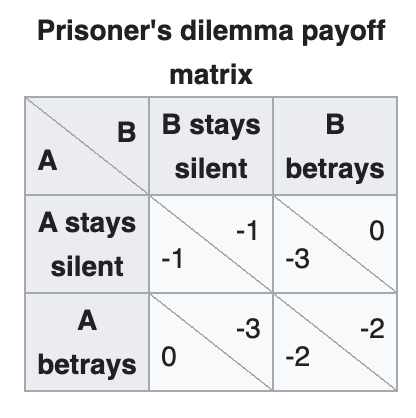
Because betraying a partner offers a greater reward than cooperating with them, all purely rational self-interested prisoners will betray the other, meaning the only possible outcome for two purely rational prisoners is for them to betray each other.
In reality, humans display a systemic bias towards cooperative behavior in this and similar games despite what is predicted by simple models of "rational" self-interested action. The more participants involved trusted each other they more they worked together for the best common outcome.
Bentoism
Bentoism is a theory that self-interest is multi-dimensional. Today, we see self-interest in terms of short-term individualism. What I, as an individual, want right now.
While this perspective is in our self-interest, it falls short of capturing the whole picture.
Bentoism (an acronym for BEyond Near Term Orientation) is a wider lens for what's valuable and in our self-interest. This includes what I as an individual want and need right now (Present Me). But it also makes space for the considerations of our future selves (Future Me), the people we rely on and who rely on us (Present Us), and the next generation (Future Us).
All of these spaces impact us and are impacted by us. They are all in our self-interest.
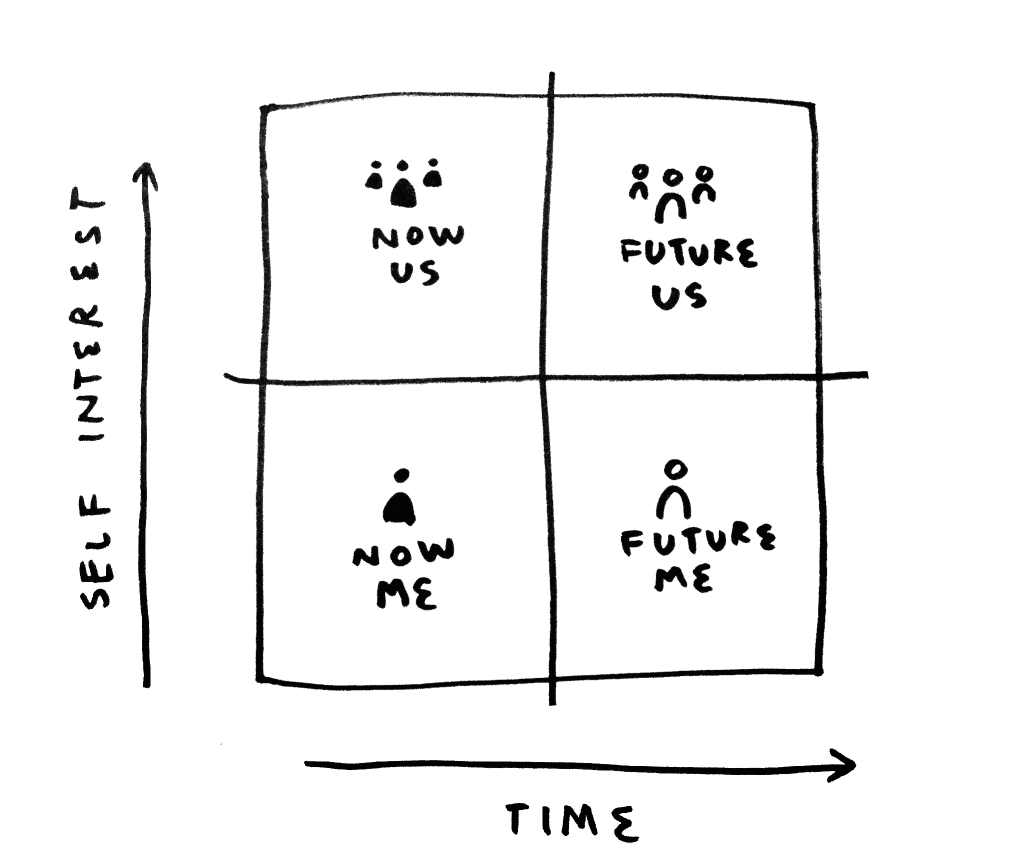
Moloch: The God of Coordination Failure
In addition to their game theoretic forms, coordination failures have even been put into more visceral forms; The infamous 2014 Meditations on Moloch essay imagines coordination failures are like a powerful demon—lording over humanity to tempt individual humans to choose defection over coordination, ultimately imposing suffering.
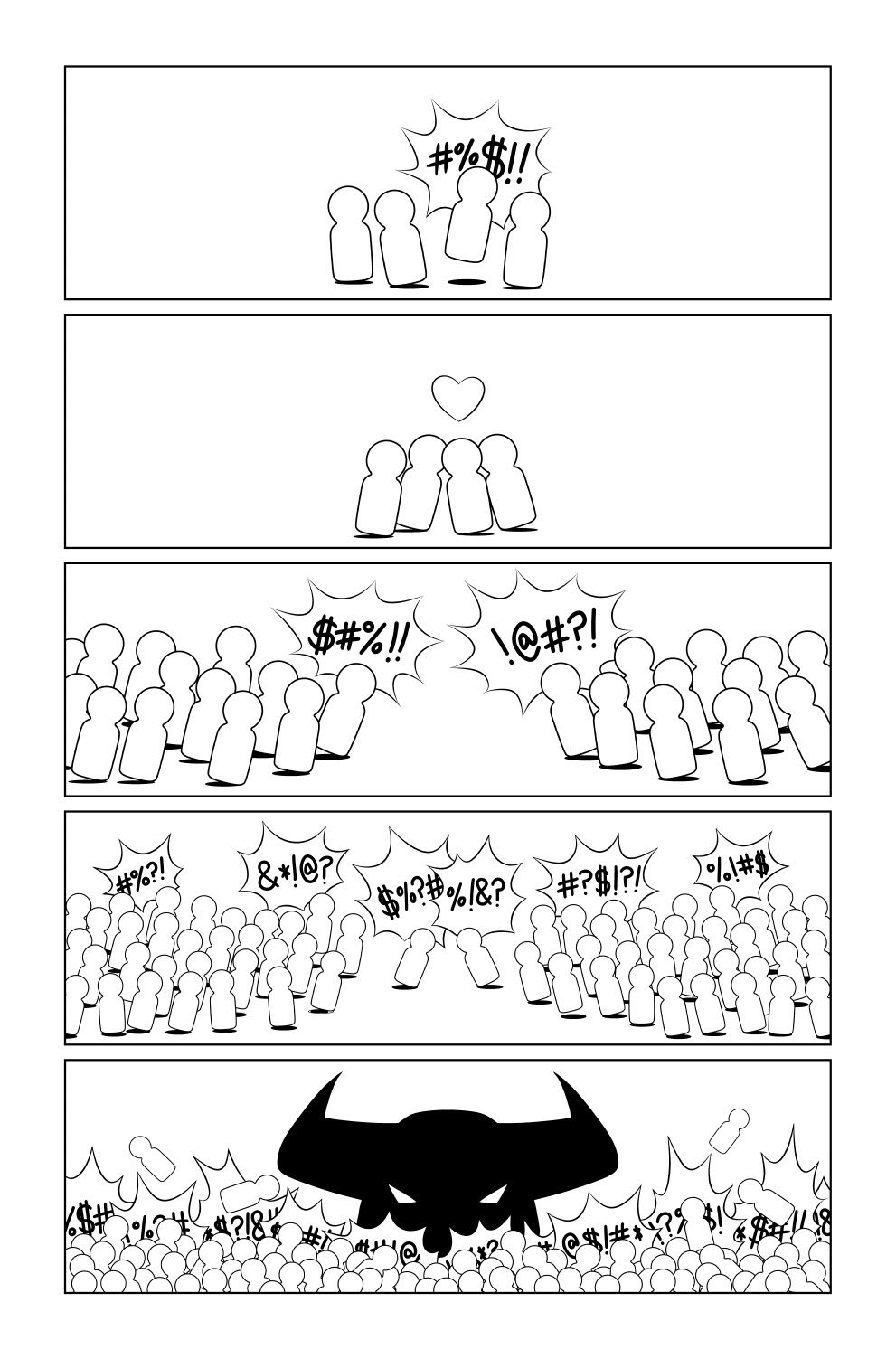
The Evolution of Trust
Nicky Case, a game designer, has created an HTML5 game which allows end-users to explore how trust—which is a high order bit when you are designing for communities that coordinate—evolves in communities.
The game is worth playing on its own (click here to play it), but here is the TLDR of the game theory behind it:
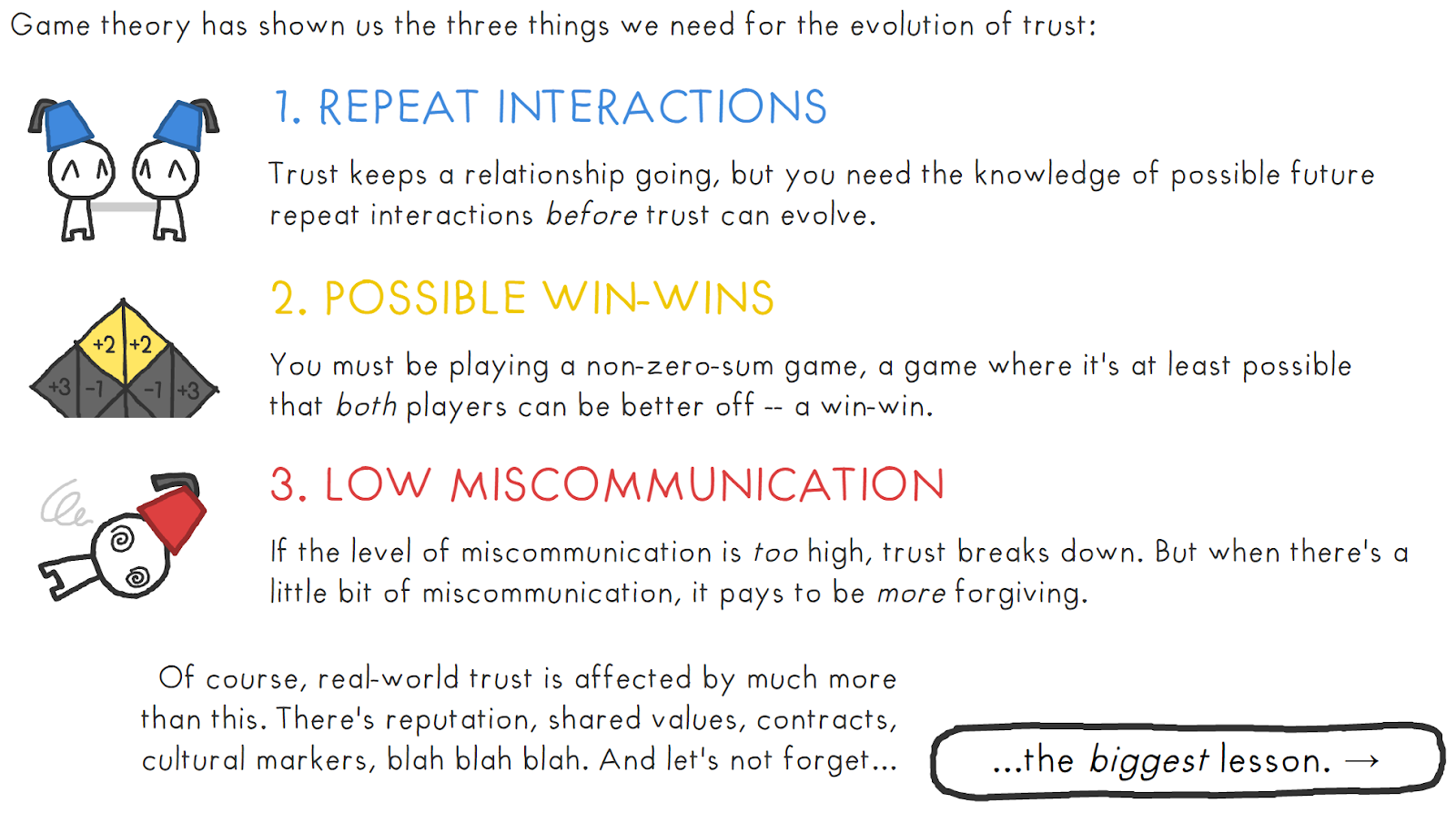
How the Industrial Age Solved This
It is worth noting that coordination of funding of public goods is something that traditionally governments have solved (with varying degrees of success). By taxing their citizens, and mandating that everyone must pay taxes through use of force, governments have effectively solved the free-rider problem. Either pay taxes or go to jail!
In some nations, this has resulted in strong funding for some public goods. In other nations, the funding is used sub-optimally, or in some cases, is used in corrupt ways and without accountability.
“Taxation is theft” is a favorite talking point of Libertarians worldwide—and government policy wonks might disagree. It is beyond the scope of this piece to spend much time on this debate; partially because it is such a complicated topic, but also because the world is changing and with new technologies and new culture, non-coercive funding of public goods is increasingly possible.
Blockchain Coordination is the solution
If only there was a technology that allowed groups of humans to choose to easily coordinate with one another! A transparent substrate for trust games where everyone knows where they stand and whose rules can’t be changed on you.
My belief is that this is the ultimate legacy of Ethereum. We can now program our values into our economic system—the final form of a stateful internet could allow us to coordinate the actions of multiple economic actors and therefore could solve coordination failures.
However, it would naturally be foolish to deny how much greed drives the blockchain ecosystem at present day. My belief is that, while that greed was necessary for blockchain technology to bootstrap itself, it is not the final form of the blockchain ecosystem. Greed (number go up) is just the boot loader.
Crypto wasn't created to make you rich — it was created to make you free.
Another way to conceive of the adoption of crypto is as like a multistage rocket:
- Phase 1 of the rocket is financial incentives (more rich).
- Phase 2 of the rocket is more sovereignty (more free).
One is designed for the lower atmosphere, the second is designed for the upper atmosphere. Unfortunately, we wouldn’t have the second without the first.
I believe in this second phase for crypto because I have seen it. I have seen a glimpse of the Quadratic Lands—a land where coordination failures have largely been solved.
Practicing Coordination
Gitcoin’s mission is to use Ethereum technology to help solve funding for digital infrastructure. Open Source Software creates $500bn/year in economic value, yet OSS maintainers are often underpaid, overworked, and under-appreciated.
This is a coordination failure!
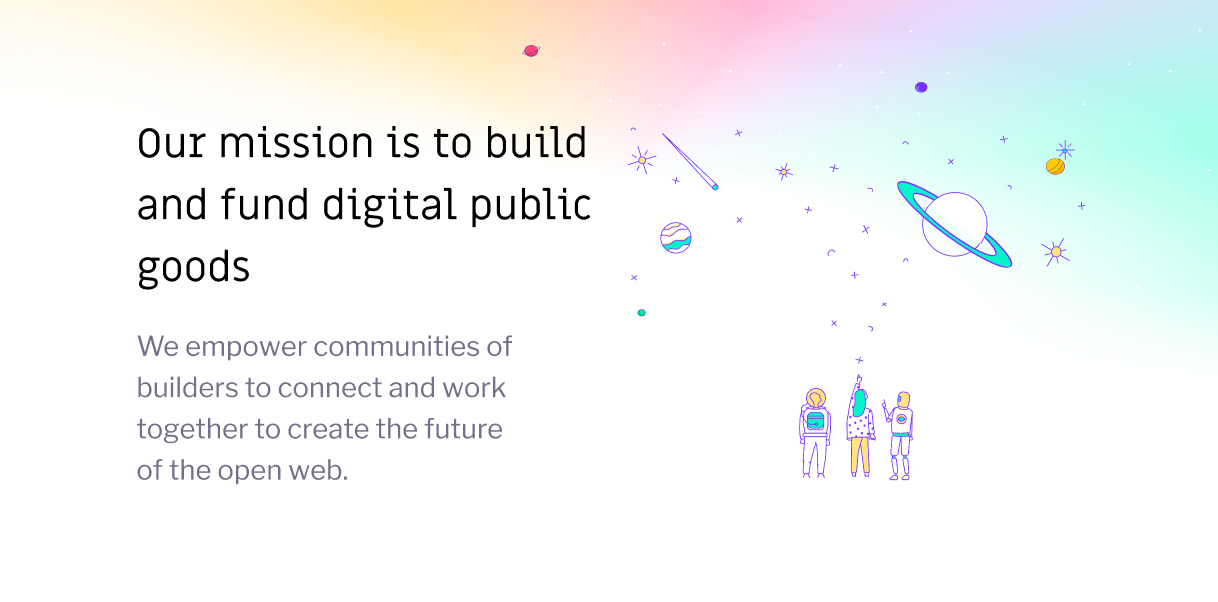
Right now, Gitcoin is doing $6mm/quarter of funding for Open Source Software and has delivered $20mm in funding to OSS Devs. We leverage Ethereum to create economic games (and relationships) between funders of Open Source & builders of it. Along the way we’ve learned about public goods—and coordination failures—and culture that can coordinate to counter them.
Our goal is to start with Open Source Software Engineers because they have an urgent need (funding). And they by definition understand the need for patience when dealing with immature technology/UX.
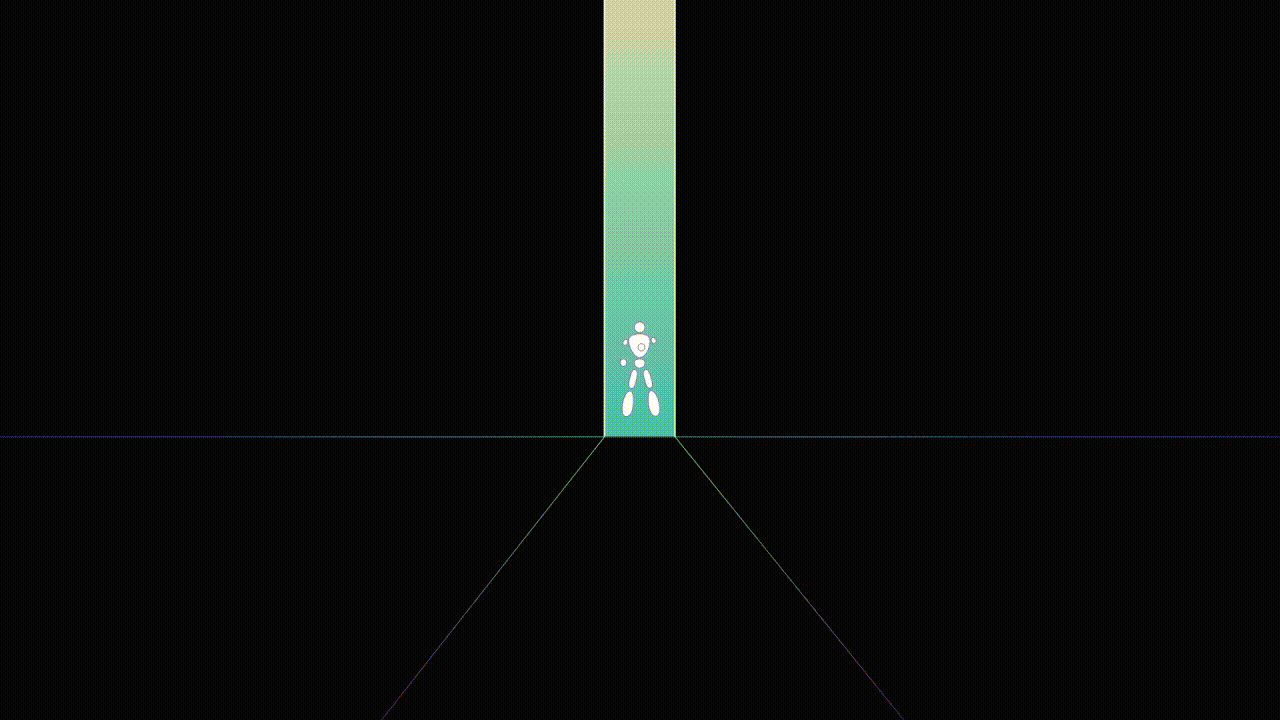
While the endgame for Gitcoin is to fund our digital infrastructure and the OSS that powers it, there is a deeper thread to pul—a powerful externality to solving OSS funding.
As blockchain technology matures, the model prototyped for funding OSS can be forked and used to assemble communities of any type against almost any coordination failure. One recent example is DowntownStimulus: A Quadratic Funding project that was designed to fund economic recovery in Boulder Colorado after COVID hit in Q2 2020.
Our next act is to take the model behind Gitcoin Grants (Quadratic Funding) to traditional Open Source Software—a project we are launching in the next month called FundOSS will be our pilot which will feature a $75k QF round.
What would it look like if we could build a machine that could come together and to finally vanquish coordination failures—vanquish Moloch?
The Ethereum community has united to donate over $10 million dollars to OSS funding on Gitcoin Grants for the last 2 years. Coordinated by Quadratic Funding, we have proven that it is possible to use the stateful internet—powered by Ethereum—to solve an important coordination failure.
It’s a non-negligible start, but much work remains ahead of us. Gitcoin would need to scale 100x to have much of an impact on the entire Open Source ecosystem, and there is work to be done to make these coordination mechanisms mainstream. The enemy, the status quo, apathy, indifference, complexity—Moloch itself—is pervasive and very powerful.
Of course, coordination is a choice and no outcome is preordained. But the deck is stacked against us. And because we know thy enemy, we know we are all agents in a multiplayer trap designed to make us fail to coordinate by default.
The good news is that Ethereum and similar technologies are here. If we are to vanquish Moloch and travel to the Quadratic Lands, much work remains. But we have hope because of Ethereum. We have hope because we know our enemy.
The solution to systemic coordination failures is to build human communities and markets in a way that enables better coordination.

Gitcoin’s efforts to solve coordination failures has evolved over time; Kevin has provided this fun little meme to show its evolution over time:
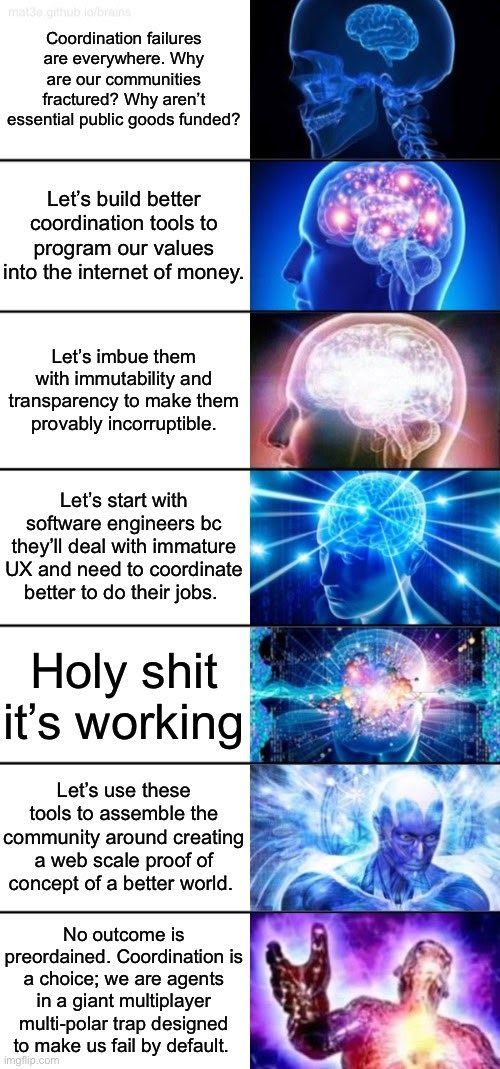
Action steps
Study what coordination failures are (know thy enemy!)
Check out these bonus resources: